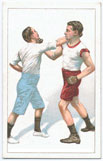 |
TOURNAMENT ROUND 1
MARCH 27, 2006 JUDGED BY ANTHONY DOERR
|
 |
Mismatch! In five years Whitney Terrell has published one very good novel, The Hunstman; in 40, McCarthy has published eight great ones. Blood Meridian and Suttree are two of the best American novels ever written, period. And to make things even rougher on Terrell, I’ve been in fixed awe of McCarthy since I was 16—his sentences, his integrity, the facts that he won’t teach, won’t do interviews, won’t fly to Jackson, Miss., and stand in front of three old ladies at a Barnes & Noble and read from his books like, well, ahem, some of us feel we must.
Full disclosure: I waited six years for No Country for Old Men. I read rumor blogs about it. Fortunately for Mr. Whitney Terrell, this showdown turned out to be anything but a mismatch.
No Country is Cormac McCarthy’s worst novel. It’s about a hunter stumbling onto a drug-deal-gone-wrong, finding a suitcase packed with cash, and taking it. A chase ensues to reclaim the money. Etcetera. It’s a thriller, speeding its protagonist through a series of violent showdowns, which is fine, I suppose, but its tendency is to replace complexity with simplicity. Rural characters often feel stereotyped, “evil” is left unknowable, and change—every time—is a bad thing. The novel’s apocalyptic vision of a 1980s American West, terrorized by rampant drugs and a pathological killer, sets a dangerously high value on a shining, romantic past that never existed. It’s violent without Blood Meridian’s harrowing beauty and fails, for the first time in all his work, to capitalize on McCarthy’s breathtaking ability to make myth from landscape. The most lavish detail in this book is spent on what kind of weaponry its characters carry.
Plus, the narrator’s father, Alton Acheson, the king of Kings County, is a once-in-a-lifetime character: long-haired, unpredictable, brimming with a slippery morality. The only bad thing I can say about this novel is that the family narrative, which is braided into the city’s narrative, feels occasionally forced, as if Terrell is trying bend A Separate Peace around Martin Dressler.
But guess what? While King of Kings County is not something I could not write in a dozen lifetimes, and I’d love to send Terrell one step closer to the Rooster, McCarthy at his worst is still better than most living American novelists and lots of dead ones, too. His dialogue, his imagination, and—as ever—his ability to use sentences to accelerate narrative ultimately won him this contest
Full disclosure: I waited six years for No Country for Old Men. I read rumor blogs about it. Fortunately for Mr. Whitney Terrell, this showdown turned out to be anything but a mismatch.
No Country is Cormac McCarthy’s worst novel. It’s about a hunter stumbling onto a drug-deal-gone-wrong, finding a suitcase packed with cash, and taking it. A chase ensues to reclaim the money. Etcetera. It’s a thriller, speeding its protagonist through a series of violent showdowns, which is fine, I suppose, but its tendency is to replace complexity with simplicity. Rural characters often feel stereotyped, “evil” is left unknowable, and change—every time—is a bad thing. The novel’s apocalyptic vision of a 1980s American West, terrorized by rampant drugs and a pathological killer, sets a dangerously high value on a shining, romantic past that never existed. It’s violent without Blood Meridian’s harrowing beauty and fails, for the first time in all his work, to capitalize on McCarthy’s breathtaking ability to make myth from landscape. The most lavish detail in this book is spent on what kind of weaponry its characters carry.
It is downright magical to watch how Terrell’s
panorama of Kansas City changes from the
‘50s to the ‘90s.
Terrell’s King of Kings County, on the other hand, lives and dies by its setting: His vision of Kansas City as it is decimated by white flight is simultaneously beautiful, tragic, and hilarious. It is a real-estate novel first and foremost and reminds me a lot of the build-homes-with-huge-lawns-in-a-desert American West I know and live in. It is downright magical to watch how Terrell’s panorama of Kansas City changes from the ‘50s to the ‘90s. panorama of Kansas City changes from the
‘50s to the ‘90s.
Plus, the narrator’s father, Alton Acheson, the king of Kings County, is a once-in-a-lifetime character: long-haired, unpredictable, brimming with a slippery morality. The only bad thing I can say about this novel is that the family narrative, which is braided into the city’s narrative, feels occasionally forced, as if Terrell is trying bend A Separate Peace around Martin Dressler.
But guess what? While King of Kings County is not something I could not write in a dozen lifetimes, and I’d love to send Terrell one step closer to the Rooster, McCarthy at his worst is still better than most living American novelists and lots of dead ones, too. His dialogue, his imagination, and—as ever—his ability to use sentences to accelerate narrative ultimately won him this contest
MATCH WINNER!!!
NO COUNTRY FOR OLD MEN by CORMAC MCCARTHY
Click here to read Kevin Guilfoile’s commentary on this match from the booth!